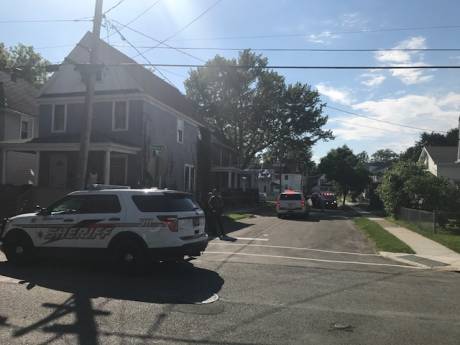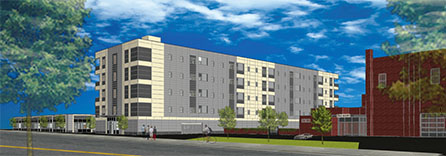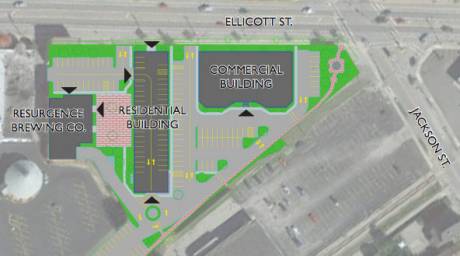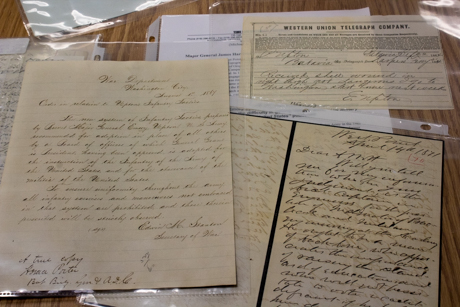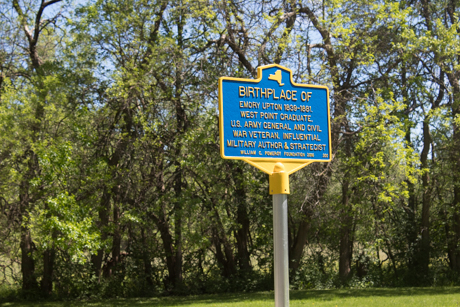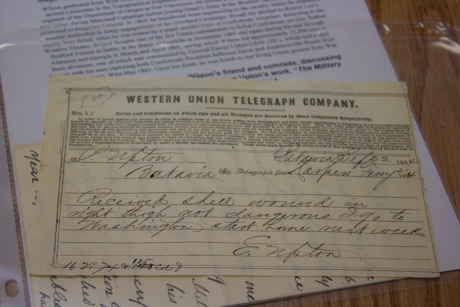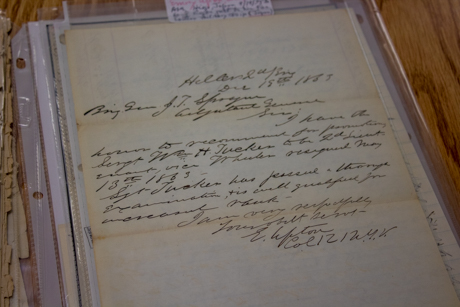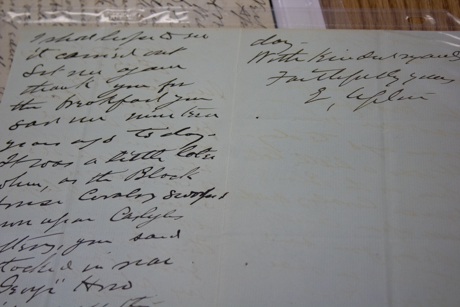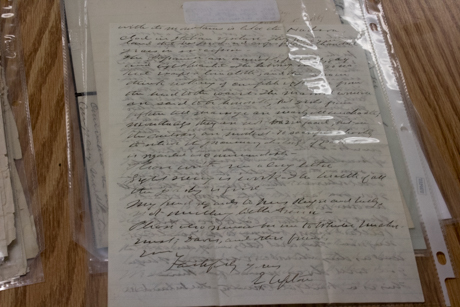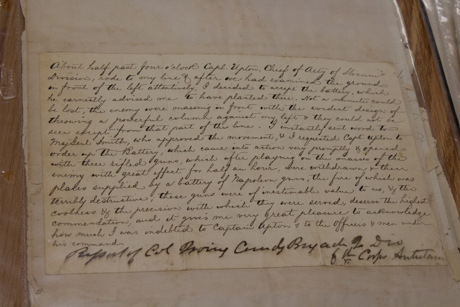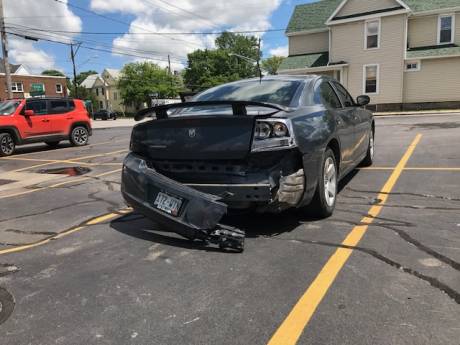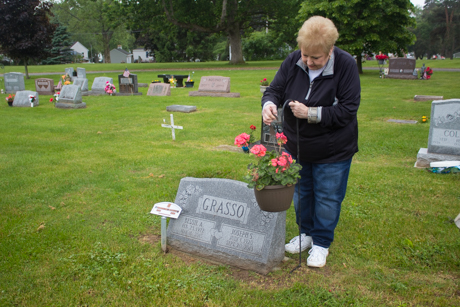The financing of the Ellicott Station project by Buffalo-Based Savarino Companies is complicated, but it's moving along at a swift pace and CEO Sam Savarino doesn't expect any delays in financing that would prevent construction from the starting this summer.
Savarino Companies will have a direct investment of about $3.5 million and will borrow approximately another $10 million or more and local, state, and federal programs will cover another $5 million or so of the more than $18 million in project expenses (a bit of an increase over prior project estimates).
Assistance programs to make the project viable come in three forms: tax abatements from the Genesee County Economic Development Center, grants from the State of New York, and a federal New Market Tax Credit program.
"We knew going in we had a hole in this budget of about $5 million," Savarino said. "The state came in, Empire State Development, and filled part of the hole with the grants that they have, but it's still left us out there and that's why we went out we said we need enough allocation to fill that hole."
That hole is being filled by the New Market Tax Credit program, created about two decades ago in part to replace grants that financed many failed urban renewal programs. Tax credits on the project that can be sold as assets help create a market-driven way to encourage development in economically distressed neighborhoods. It's a way for the market to help decide which projects are worthy of assistance rather than the federal government making the decision.
The tax credits are administered by Community Development Entities (these can be for-profit companies or nonprofit agencies). The CDEs decide which projects to back. The tax credits are then sold to investors, who can use the tax credits or sell them on the open market.
"An area like this particular area is a distressed area," Savarino said. "It's got way more unemployment than other areas in the county. It's got way more incidents of poverty of people living there, more than any other part of the county. It's also a brownfield site. So it's got all those things going against it. That's just the type of site -- and by the way that has prevented its redevelopment -- it makes it too expensive to really redevelop. It's not really marketable. That's exactly the type of project that the New Market Tax Credit program is meant to address. But there are federal tax credits and they're meant to bring life into sites and generally in cities that don't have that much of a chance."
Julie Pacatte, economic development coordinator for the Batavia Development Corp., said Ellicott Station is unique in the county because the total investment exceeds $5 million to $10 million, which is necessary to even attract New Market Tax Credits.
"That's what makes it difficult for rural communities to access the program because projects generally don't project to that kind of scale to access the program," Pacatte said.
Savarino said the Ellicott Station project will use about $7.5 million in tax credits, which will translate into about $2.5 million in direct investment into the project.
Without the assistance programs, traditional lenders wouldn't even consider a project with the liabilities of the former Della Penna property, which needs extensive environmental remediation and is in a neighborhood with higher than average unemployment and lower than average incomes.
"There's no way it would even be financeable," Savarino said. "It's not just a developer like ourselves coming in and so everybody can gainsay your efforts over there because of you and you are out there trying to -- you're not going to do this to lose money. We're judged more harshly by the people who come and provide the financing for something like this.
"So we take a risk for going out and risking that we're going to lease up these units. We're risking that will lease up the commercial space. We're taking the risk that we've got a cap on the cost, and we have all the normal risk that you have (in a development)."
Some of the risk is mitigated by the fact that Savarino has already secured an anchor tenant for the project, Resurgence Brewery, out of Buffalo, which will open a restaurant, beer garden and sour beer brewery at the location. That business is expected to create at least 15 full-time jobs.
Savarino said the Resurgence owners are eager to get going and would move in today if they could.
The complicated financing isn't anything new for Savarino Companies, which has been involved in redeveloping several properties in Buffalo that were also highly distressed and needed to make variety a variety of financing and investment options to make them viable.
The New Market Tax Credit is limited to the commercial side of the project. For that, Savarino must secure the tax credits, attract the investors, find additional financing, get the proper approvals from local and state officials, and then the company must still also secure financing for the apartment complex.
Over the course of planning, the apartment complex has gone from 30 units to 42, to 47, and now the plans call for 54 units.
"When we started laying it out and we actually got the building down, we got to our unit mix and it turned out that we could fit 54 units in there," Savarino said.
That's one reason the costs have gone up a bit, but a recent environmental examination of the property also uncovered a surprise -- a previously unknown storm water drainage canal running under the entire length property.
The canal -- they're calling it the "Grand Canal" -- shows up on no maps, no site drawings, no infrastructure maps. It was built of brick long, long ago and forgotten about.
There's also evidence of contamination in the canal.
The best-case scenario is the canal can be declared as abandoned and filled in (as a matter of engineering, the buildings can't just be built on top of it), but if it needs to be rerouted, it can either be mitigated by connecting it to existing drainage lines under Ellicott Street or put under the easement for the new Ellicott Trail, which will run behind Ellicott Station. Savarino isn't expecting the canal to blow up the budget.
"Some of that is just the nature of the brownfield redevelopment and the remediation program of the state's is intended to offset those costs," Savarino said. "So to the extent that you find something that's a little worse than what you knew about, your site-prep costs will go up, and hopefully it works out such that you get the tax credits to offset that cost."
Savarino and Pacatte were at the Genesee County Planning Board meeting last night as part of the process of getting land-use approvals for the project.
The planning committee recommended approval of the site plan.
The project moves forward next with a GCEDC public hearing June 20 on the $1.5 million tax incentive package, which includes breaks on sales and mortgage tax, and a payment in lieu of taxes plan on the new tax liabilities generated by the increase in assessed value of the property. That same day, the city's Planning Committee will review the site plan and on June 22, the Zoning Board will review the plan.
This morning, the County Legislature held a special meeting to approve a $225,000 grant to assist construction of the brewery and restaurant for Resurgence Brewery. The grant is a pass-through of federal Community Development Block Grant money administered by the state's Office of Community Renewal. The special meeting was necessary because today was the deadline for completing the application.
Savarino said he doesn't anticipate any delays in financing, that financing should close in July and construction will begin in August.
